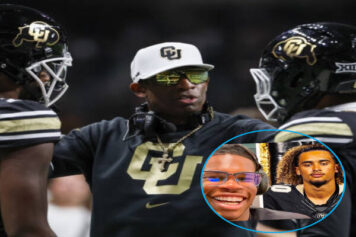There’s no pretense with a guy like Spike Lee. No need, really.
The celebrated writer, actor and director is quick with his answers, unapologetic and kind of scary – exactly who a man of his caliber should be.
Ask Lee a question about his career, his life, his current projects – anything, really — and he may not answer. Or he may give you a partial answer. And you have to accept it because, well, you just have to. Lee isn’t the kind of guy who gives you choices. He prefers to just put his work on display and let the fans – and OK, the critics, too – have at it and come up with their own theories.
This ain’t Half Pint. This is … Mookie after he bossed up and tossed the trashcan into the windowpane at Sal’s Pizzeria.
Lee also is honest. Brutally honest. And blunt. And surprisingly – considering how scary he is – kind of funny. And he in no way, shape or form is afraid of what the Hollywood suits – or an interviewer – might think of him.
In short: Lee is not to be trifled with. Not even a little bit.
So just how gangsta is Spike Lee? Last month, he began directing Mike Tyson in a one-man show on Broadway, and this week, he’ll release Red Hook Summer, a complicated tale of a grandson, his preacher grandfather, and the secrets that haunt their family (no need for a spoiler alert, but Red Hook Summer likely will go down as one of Lee’s most compelling – and controversial — stories ever).
OK, so here’s a bit of a spoiler alert – Lee touches on a dark, ugly crime that played out in the pulpit, grabbed a few high profile headlines as of late and his film may or may not have been inspired by those charges filed against a particular man of the cloth.
But Lee’s not confirming one way or the other.
The Shadow League talks with Lee about his movies, Tyson and why his epic biopic Malcolm X – which turns 20 this year – would NEVER be made in 2012.
*****
TSL: Red Hook Summer is really compelling and it’s self-financed. You made a point of saying you didn’t even think of taking this film to Hollywood. Why is that?
LEE: That would’ve been futile.
TSL: You don’t think they would’ve bought into it?
LEE: It’s not the type of film they’re doing now. I’m not condemning them. They’re just not making this type of film. I don’t think I could get Do the Right Thing made today.
TSL: So what’s changed in the last 20 years?
LEE: The people running the studios.
TSL: But you certainly still have a fan base out there who supports the story telling that you do …
LEE: Well, I really can’t speak for them, but James [McBride, Red Hook's co-writer/producer] and I knew that it would’ve been a fruitless exercise knocking on doors to try to get this film made, so I said, I’m gonna finance it myself.
TSL: What inspires you, at this point in your career…?
LEE: Keep telling stories. That’s the inspiration, cause I love what I do.
TSL: Do you just kind of look at the world around you or do you draw from something else?
LEE: I mean, inspiration comes from anywhere and everywhere, so I’m open to it wherever it comes from.
TSL: One cool thing about this film: you used a lot of your students from NYU …
LEE: Well, they’re behind the camera.
TSL: What went into developing them to work on this project?
LEE: {Laughs} Well, they’re my students.
TSL: So they’ve learned from the best?
LEE: Thank you.
TSL: You’re welcome …
LEE: I’ve been teaching at NYU, the graduate film school, the last 15 years. I’m also the artistic director for many of those 15 years and I have very talented students. Very talented students come out of the NYU graduate film school. And if you have the opportunity to let them make some money and work on a film. It’s not a student film, you know, this is real film and give them some experience, you know, how it is. There were a couple times I had to yell at them, but, you know, they were shocked. We’re not in school now! This is my money on this motherfucker! The fuck you doin?
TSL: I would not have wanted to be on the end of that conversation on your set.
LEE: It’s one-sided!
TSL: Development is obviously something that’s very important to you. You have financed the sports journalism program at your alma mater, Morehouse and now this. We’re not really seeing that from other directors on your level …
LEE: I’m not the only one doing this, so I can’t claim that. But if I’m a teacher and I’m directing a film and it’s in the summer and I don’t give my students an opportunity, what’s the point then? That’s…you shouldn’t be teaching.
TSL: Yeah. But it doesn’t just stop with the film thing. We talked about what you’ve done at Morehouse College. That’s incredible…with the sports journalism…
LEE: Yeah, that’s with the late, great Ralph Wiley, where we started our sports journalism program at Morehouse College.
TSL: Journalists appreciate that.
LEE: People get jobs too!
TSL: You pay a nice homage to the Knicks and Carmelo Anthony in Red Hook Summer.
LEE: Well, we’re not making it up. Carmelo grew up in apartment 1C, 79 Lorraine St. in the Red Projects then his family moved to West Baltimore.
TSL: And you actually shot in his old apartment. Why was it important to kind of make it that authentic, to actually shoot physically in the apartment that he lived in?
LEE: Cause it’s there. [Laughs] I mean, he’s from Red Hook. He’s from the Hook. Carmelo Anthony!
TSL: Malcolm X has a big anniversary coming up this year …
LEE: Yeah, November 10th will be 20 years.
TSL: Could that film get made today?
LEE: Hell no.
TSL: No? You don’t think we’d be interested or Hollywood would be interested in learning about that story?
LEE: Hell to the nah.
TSL: But you’re Spike Lee…
LEE: [In unison] Hell to the no!
TSL: Everyone is excited about the Tyson Show, how did that come together? What was the genesis of that project?
LEE: Well, Mike had done that in Las Vegas a couple months ago and Kerwin DeVonish, the guy that shot Red Hook Summer, he was in Las Vegas, he told me about it. I tracked down Mike and his wife Keke, they were in Poland at the time, and they were able to get me a DVD. I loved it and then I called up James Nederlander … and the Shuberts are the two families that are…they’re Broadway. And Jimmy, we’re friends, he’s been trying to get me to do something on Broadway for a while, so I showed him the thing and he liked it. SO, now he said, "Let’s bring it to Broadway." It opened July 31, limited run. Nobody’s playing Mike Tyson, it’s him in the flesh on the Broadway stage.
TSL: Why is it right that this is your first Broadway project?
LEE: Well, I’ve been thinking about it. You know, for many years my wife’s been telling me to make Do the Right Thing into a musical. I think School Daze, one day I’m gonna do that on Broadway. So it’s been timing and also…for me, I’m a great believer in timing, so I just felt that this is the right time now.
TSL: What did you see in that DVD that made you say, Yes, green light?
LEE: Yeah, his light is an amazing story. It’s amazing the stuff he’s gone through.
TSL: What stood out to you?
LEE: It’s not just one thing, it’s his entire life.
TSL: Back to Red Hook Summer…what is it that you hope people walk away from the film feeling or talking about …
LEE: I don’t ask those questions.
TSL: You don’t?
LEE: It would be presumptuous of me…I mean, why should I tell audience what they should feel coming out the theater? They’re intelligent people, they’re gonna … everybody brings their own world, their own experience to any movie, any play, any concert, you bring your own experience to that thing and you react to it the way you react to it, so I’m not gonna be a dictator and say, You must feel this way! — coming out of a theater. I’m not gonna do that. I just hope people come out and support it.



